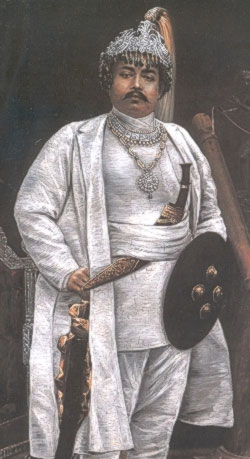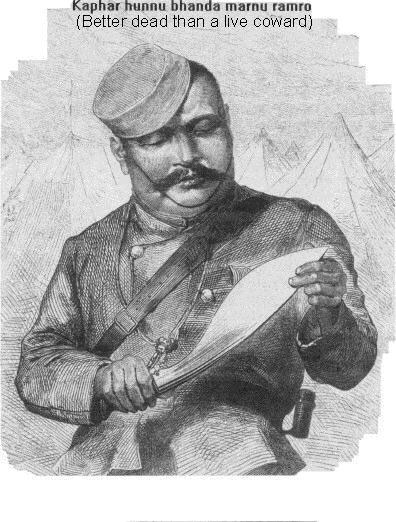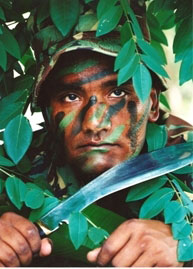About Gurkhas
The Gurkhas:
Some sources say that in the mid-18th Century, in a small principality called “Gorkha” under King Prithivi Narayaan conquered and united most of what is today known as Nepal, and went on to expand their kingdom to an area that extends from the Border of Kashmir in the northwest, to Bhutan in the east; establishing Hinduism – with distinct Rajput warrior and Gorkhanath influences – as the official state religion.
 Other sources disagree, saying that it is the other way around – they believe the locality took its name from the Gorkha people of that region. These sources contend that in the early 1500s some of the descendants of Bappa Rawal – a powerful and famous ruler of India’s Mewar Dynasty – went further east, to conquer a small state in present-day Nepal, which they named Gorkha in honour of their patron saint; and that by 1769, under the leadership of Sri Panch Maharaj, Dhiraj Prithvi Narayan Shahdev (1769–1775), the Gorkha Dynasty controlled the area which is modern Nepal.
Other sources disagree, saying that it is the other way around – they believe the locality took its name from the Gorkha people of that region. These sources contend that in the early 1500s some of the descendants of Bappa Rawal – a powerful and famous ruler of India’s Mewar Dynasty – went further east, to conquer a small state in present-day Nepal, which they named Gorkha in honour of their patron saint; and that by 1769, under the leadership of Sri Panch Maharaj, Dhiraj Prithvi Narayan Shahdev (1769–1775), the Gorkha Dynasty controlled the area which is modern Nepal.
Whether the people took the name of the region or the region was given the name of the people, though, the Gurkhas evolved a simple, but unique philosophy of life, which epitomizes the very essence of what it means to be a warrior: They believe it is better to be dead than to be a coward.
Even the name itself, “Gurkha” comes from the root, “gorkhali,” which in our language is another name for, valor, courage, steadfastness, loyalty, and neutrality or impartiality.
So it is with good reason that their traditional war cry, given in battle preparatory to a charge, is enough to chill the blood of the most determined adversary: “Jai Mahakali, Ayo Gorkhali!!!” – “Glory to the Goddess of War, here come the Gurkhas!”
It may be hard for modern, 21st Century people to understand, but during this warlike era of unification, it is said that the nation, its warriors, and their weapon; the khukuri; became as one. Just as it was said by the legendary Japanese samurai warriors that, “The sword is the soul of the samurai,” It was said of the khukuri and the warriors who carried them, “Without the one, the other is nothing.”
The relationship of the Gurkha to his khukuri goes back to the earliest days of the Nepalese nation. For almost 200 years, they have served in the British Army thanks to the Treaty of Segauli, which made them allies and brothers in arms. They are not mercenaries, but full members of the British Army. Their relationship with the British is unique in history.
When the Gurkhas began to have clashes with the crack troops guarding territory controlled by the British East India Company, the British quickly declared war against them… and soon discovered that declaring war on a Gurkha was one thing, but conquering him was something else entirely.
During this conflict though, something truly remarkable happened – something not often seen in the annals of warfare: Each side noted not only the valor, but also the honor and courtesy with which the other side fought, and each side came to admire the bravery and chivalry of their opponents.
In the Spring of 1816, in a singular gesture of respect for a worthy adversary, the British decided not only to make peace with the Gurkhas, but to forge an alliance with these brave little men with the big knives, who seemed to have all of the qualities that make an ideal infantryman:
Thus, on March 4, 1816, the Treaty of Sugauli was ratified and a provision was made that allowed the British to recruit them into the British Army as a Brigade of Gurkhas. On that day, a long-standing alliance between the British and the Gurkhas that endures to this day.
Ever since that time, Nepalese troops from the the Rai’s , Limbus, Gurungs, Magar, and other Nepalese clans have served proudly in the British Army. Their courage, sincerity and loyalty have won them the praise and friendship of their British counterparts, and the fear and respect of their enemies; and won many metals and unit commendations for their courage on the battlefield, including even the Victoria Cross, Britain’s highest military honor.
 In the 158 years since the Victoria Cross was created for conspicuous valor and extreme courage in the face of the enemy, only 1,357 have been awarded; twenty-six have been awarded to members of Gurkha regiments.
In the 158 years since the Victoria Cross was created for conspicuous valor and extreme courage in the face of the enemy, only 1,357 have been awarded; twenty-six have been awarded to members of Gurkha regiments.
 The near-superhuman courage which Gurkhas manifest on the battlefield is legendary – The Gurkha’s story has been indelibly written on battlefields throughout the world. In WWI alone, some 20,000 Gurkhas gave their lives in battles that raged as far away as France, Turkey, Palestine, and Mesopotamia. In at least one case – The Battle of Loos, they literally fought to the last man. They were often the first troops to arrive and the last to leave.
The near-superhuman courage which Gurkhas manifest on the battlefield is legendary – The Gurkha’s story has been indelibly written on battlefields throughout the world. In WWI alone, some 20,000 Gurkhas gave their lives in battles that raged as far away as France, Turkey, Palestine, and Mesopotamia. In at least one case – The Battle of Loos, they literally fought to the last man. They were often the first troops to arrive and the last to leave.
The Gurkha Welfare Trust, which was organized by the British to assist their Gurkha veterans acknowledged that “If there was a minute’s silence for every Gurkha casualty from the World War alone (meaning World War I), we would have to keep quiet for two weeks.”
Sam Maneskshaw, Former Chief of Staff of the Indian Army, once commented, “If a man is not afraid of dying, then he is either lying, or he is a Gurkha.”
This kind of courage has won the highest admiration and praise from their British allies. Sir Ralph Turner, of the 3rd Queen Alexander’s Own Gurkha Rifles was once moved to comment about the Gurkhas,“ As I write these last words, my thoughts return to you who were my comrades, the stubborn and indomitable peasants of Nepal. Once more I hear the laughter with which you greeted every hardship. Once more I see you in your bivouacs or about your fires, on forced march or in the trenches, now shivering with wet and cold, now scorched by a pitiless and burning sun. Uncomplaining you endure hunger and thirst and wounds; and at the last your unwavering lines disappear into the smoke and wrath of battle. Bravest of the brave, most generous of the generous, never had country more faithful friends than you. ”
